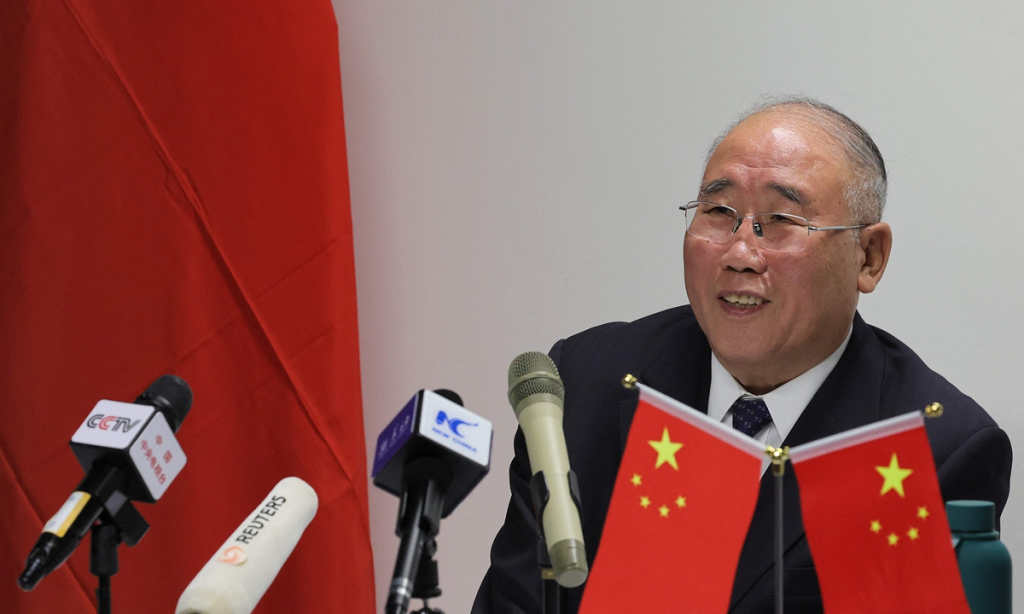Published: December 13,2022
By Xu Yelu

China’s special climate envoy Xie Zhenhua gives a press conference at the United Nations climate summit in Dubai on December 9, 2023.Photo: VCG
China supports fair trade of climate-friendly technologies and products, including zero-carbon and low-carbon technologies and products, Xie Zhenhua, China’s special envoy for climate change, said during the 28th session of the Conference of the Parties to the United Nations Framework Convention on Climate Change (COP28) held in Dubai, United Arab Emirates on Saturday local time.
In recent years, many countries have introduced new regulations related to trade, taxation, and other areas under the guise of climate policies, which have affected international trade, including new-energy equipment and low-carbon products. Climate action is a cause that protects the future of the Earth and benefits future generations, so everyone should support it and should not seek to set up trade barriers and restrictions that are detrimental to climate change efforts, Xie noted.
One of the biggest topics of debate among participating parties at the COP28 was whether to gradually reduce or eliminate fossil fuels. Xie stated that there are no less than four options when it comes to the future of fossil fuels. China is currently engaged in intensive consultations with major countries and groups, hoping to find a clear and correct future direction that reflects positive energy and maximum inclusiveness, so that everyone can accept it. Positive progress has been made in the negotiations on this issue, he noted.
During the COP28 conference, experts from China released a document entitled China’s Pragmatic Actions to Address Global Climate Change Report, introducing to the international community the practical efforts made by China in various aspects, including top-level policy design, local pilot projects, energy transformation, industrial diffusion, urban and rural construction, circular economy, green finance, nationwide action and international cooperation. It is believed that this will change the perception of many people who were previously unaware of China’s climate policies and advantages, experts said.
Regarding the issue of fossil fuels, some countries strongly oppose the elimination or reduction of fossil fuels, while others have a clear stance in favor of eliminating fossil fuels. Some other parties have proposed compromise solutions. Xie said that all parties still hope to achieve maximum inclusiveness and reflect the direction of progress on this issue. “It is estimated that it should be resolved in the next day or two,” Xie stressed.
During the COP28 conference, more than 120 countries agreed to double global renewable energy generation capacity by 2030.
In response to this development, Xie said that China has made significant contributions to the global development of renewable energy. With China’s enormous efforts, the cost of wind power has already decreased by 80 percent and the cost of solar power has decreased by 90 percent, laying a solid foundation for the large-scale deployment of renewable energy worldwide.
At the COP28 conference, it is widely felt that the dual-carbon policy proposed by China and the subsequent series of implemented actions have been highly recognized by industry insiders, both domestic and international, Ma Jun, director of the Beijing-based Institute of Public and Environmental Affairs, who is also attending COP28 in Dubai, told the Global Times on Saturday.
In particular, China’s rapid progress in renewable energy has left a deep impression on the attending leaders and has also boosted confidence in other countries, injecting momentum into the global energy transition.
In a historic move, a loss and damage fund was agreed at the opening plenary of the first day of the COP 28 conference which will assist developing countries that are particularly vulnerable to the adverse effects of climate change.
Regarding the fund, Xie said that funding is now being raised and operated, and that China strongly supports the initiative. He disclosed that China is mainly strengthening cooperation and support for developing countries through South-South cooperation and the green Belt and Road Initiative. “We have already taken concrete actions,” Xie said, adding that China has provided both financial contributions and technical cooperation and support.
To date, China has signed 48 memorandums of understanding on South-South cooperation on climate change with 40 developing countries, collaborated in the construction of four low-carbon demonstration zones, implemented 75 projects for climate change mitigation and adaptation, and organized 57 training sessions on South-South cooperation for climate change.
China has been engaged in South-South cooperation in the field of climate change for many years, helping developing countries enhance their capacity to address climate change. China has already engaged in green-energy projects and cooperation with over 100 countries and regions. Additionally, China has constructed wind and solar power projects in countries such as Ethiopia, Argentina and Montenegro.
Experts believe that Xie’s responses to these questions reflect China’s advantage in combining sustainability and development in climate policies. While emphasizing the need for all countries to promote the development of renewable energy, China also respects the development needs of energy-producing countries and plays a coordinating role in the process, Ma said.
China’s advantage lies in the speed of development in renewable energy and the development of new-energy vehicles, which is also a concern for many countries that fear only China can enjoy the benefits of economic transformation. However, China hopes to share its development achievements more with various countries locally, emphasizing cooperation rather than using trade protectionism to hinder development, he noted.
globaltimes.cn
 Africa -China Review Africa -China Cooperation and Transformation
Africa -China Review Africa -China Cooperation and Transformation
